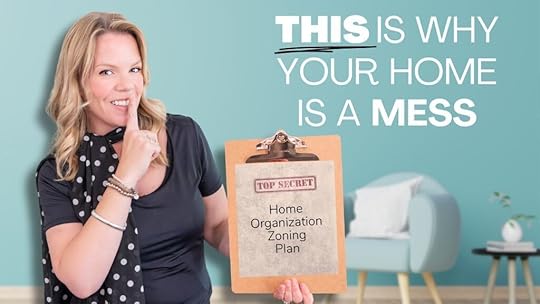The Secret to a Tidy Home: Zoning 101

Zoning your home is the missing piece most people overlook when trying to get organized.  If you skip this step, your house will never be easy to maintain. I know that sounds dramatic, but itâs true. Once you nail this, your house practically organizes itself.
So grab a metaphorical tour bus ticket because Iâm going to be your guide as we explore the ârealm of zoning.â ðâ¨
What Is Zoning (and Why Does It Matter)?Zoning means giving every category of items in your home a specific place to live â not just in a random drawer, but in a logical, functional âzone.â
Think of it like this:
Regions = Rooms
Cities = Activity areas inside the room
Neighborhoods = Smaller categories within those areas
When everything has a clear âaddress,â itâs easy for anyone in your family to find it and put it back. Thatâs how you stop the endless cycle of tidying and re-tidying.
STEP 1: Map Your HomeBefore you buy bins or baskets, sketch out your house. Each room is a region.
Then within each room, divide it into cities. For example, in the kitchen you might have:
Hot Beverage City: coffee maker, mugs, tea, sugar
Cooking City: pots, pans, utensils
Snack City: chips, granola bars, treats
Inside each city are the neighbourhoods. For instance, in Hot Beverage City, you might have the âCoffee Neighborhoodâ (all your coffee stuff together) and the âTea Neighbourhoodâ (all your tea together).
STEP 2: Tour Your Home by ZonesLetâs take a tour of some common zones so you can see how this works:
The Entrance ZoneThis is your landing region â coats, shoes, bags, and keys. Break it down further into:
Mudroom City: shoes, boots, coats
Utility City: batteries, manuals, flashlights
The Craft ZoneIf youâre a crafter, you need a dedicated Craft City (whether itâs a whole room, a corner, or just one drawer). Inside:
Tool Town: scissors, glue, tape
Kidsâ Crafts Neighborhood: crayons, markers, paper
Your Hobbies Neighborhood: yarn, paints, or whatever you love
The Exercise ZoneEven if you donât work out much (same ðââï¸), keeping equipment together is key. Dumbbells, yoga mats, and resistance bands all belong in Strength City â ideally near where you actually use them.
The Guest ZoneThink like a host: guests should easily find everything they need.
Snack Neighborhood: granola bars, drinks
Toiletry Neighborhood: spare toothbrush, soap, lotion
Comfort Neighborhood: blankets, towels, pillows
The Pet ZonePets need their own city too! Put bowls, treats, leashes, and meds all together in Pet City so nothing gets lost (and your family knows where to look).
STEP 3: Zone for LazinessZoning isnât about perfection â itâs about making life easier. Put things where you use them.
Dishes should live near the dishwasher.
Dog food should be stored right where you feed your dog.
First aid and medicines should be neighbors in the bathroom so you can grab a bandage and Advil in one trip.
When you zone for laziness, you save time and energy â and your home naturally stays tidier.
STEP 4: Declutter + Zone = MagicHereâs the hard truth: you canât zone clutter. If youâve got duplicates, random piles, or stuff scattered across multiple rooms, youâll never feel on top of it.
Declutter first. Then zone whatâs left.
ð This way, when you pick something up, youâll instantly know where it belongs. And if it doesnât have a zone? Thatâs your clue it probably doesnât belong in your home.
I recently worked with Jessica McCabe from How to ADHD and her partner, Raph, on their âdoom room.â At first, you couldnât even see the floor. But once we decluttered and zoned their house, everything clicked.
Now when they pick up an item, they know exactly where it goes. And if it doesnât have a zone? It doesnât stay.
Their entire home has stayed tidy since, because zoning takes away the guesswork.
ð¡ See their makeover here!Â
Your Homework: Make Your Map ðºï¸Grab a notebook and walk through your house like youâre a stranger who just moved in.
Sketch each room (region).
Break it into cities based on activities.
Create neighbourhoods for the smaller categories.
It may mean moving things around at first, but once every âneighbourâ lives beside its logical friends, your house will practically run itself.
ð Subscribe to my Podcast Channel & Get Inspired! https://www.youtube.com/channel/UCzb9pSHe_w_e1jeg5BaK-bQ? sub_confirmation=1
𧺠ORGANIZING & STORAGE SOLUTIONS FOR YOUR UNIQUE ORGANIZING STYLE: https://clutterbug.me/2025/02/storage-and-organizing-solutions-to-fit-your-style.html
⨠DECLUTTER & CLEAN LIKE A PRO – My Top Picks
Fave Cleaning Tools : https://urlgeni.us/amazon/2xYW0
Fave Organizing Solutions: https://urlgeni.us/amazon/JOrJm
Kitchen Organizing Faves: https://urlgeni.us/amazon/8YWRx
ðï¸ SHOP MY AMAZON: https://urlgeni.us/amazon/Clutterbug
ð² Letâs Get Social! Follow Me Here â
Instagram: https://urlgeni.us/instagram/ffwh
Facebook: https://urlgeni.us/facebook/Clutterbug
TikTok: https://urlgeni.us/tiktok/TikTokClutterbug
Website: http://www.clutterbug.me
Some links are Amazon affiliate links to products I love! I may earn a small commissions for purchases made through these links (but don’t worry, it doesn’t cost you anything extra)



